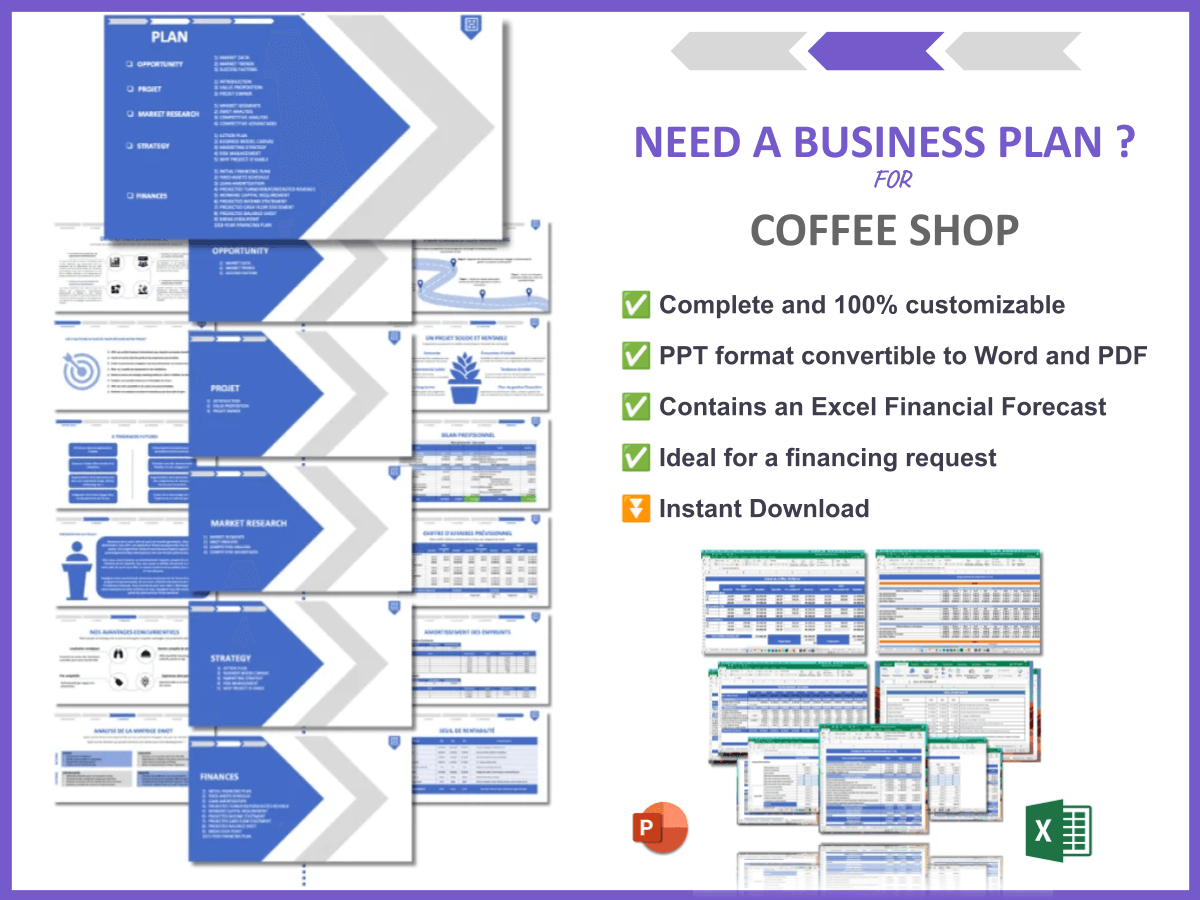Did you know that coffee shops have become one of the most favored spots for socializing among millennials? How To Start a Coffee Shop is an important question for anyone aspiring to turn latte love into a thriving business. A coffee shop is much more than just a place to grab a caffeine fix; it’s a space of connection, creativity, and comfort.
In this article, we will explore the avenues to effectively launch your coffee shop dream. Just to give you an idea of what we’ll go over:
- Defining your unique coffee shop concept.
- Conducting thorough market research for your niche.
- Selecting the ideal location.
- Writing a robust business plan.
- Navigating registrations and licenses.
- Developing a strong marketing strategy.
1. What Makes a Great Coffee Shop Concept?
Starting with a strong concept can set the tone for your entire coffee shop journey. It’s the centerpiece of your business, influencing everything from your menu to your atmosphere. Think about what differentiates you in a crowded market. Here are some ideas to consider:
- Unique Offerings: Perhaps you want to focus on artisanal coffees or organic teas.
- Ambiance: Consider a cozy reading nook or a modern workspace vibe.
- Your Target Audience: Are you aiming to serve students, remote workers, or families?
This thought process helps you develop a distinctive coffee shop business plan. Ultimately, this unique perspective is what drives a loyal customer base and sets the path for your future success.
2. Conduct In-Depth Market Research for Your Coffee Shop
Understanding your local market is key to developing your coffee shop. Market research will help you grasp competitors’ strengths and weaknesses as well as identify potential customer needs. Here’s how to approach it:
| Step | Details |
|---|---|
| Identify Competitors | Visit local coffee shops to assess their offerings, pricing, and customer experience. Take notes! |
| Analyze Customer Preferences | Engage with potential customers through informal surveys or social media polls. |
| Look for Gaps | What needs aren’t being met? Make use of this to guide your idea and menu. |
Market research is not a one-time task. I recommend continually observing your competition and adjusting your business strategy as you go. If you notice trends, adapt to meet those changes! This will help you create a successful and enduring coffee shop that people will love.
3. Choosing the Perfect Location for Your Coffee Shop
Your coffee shop’s success or failure depends on its location. Think about where your potential customers are hanging out; it’s all about foot traffic and visibility. In fact, a significant 85% of customers choose a coffee shop based on its location!
Here are a few factors to consider when selecting your site:
- Demographics: Know who your customers are. Is your target market students, professionals, or families?
- Accessibility: The easier it is for people to pop in, the more likely they will do so. Look for heavily-trafficked areas.
- Competition: Consider the distance of other coffee shops. Too many nearby can saturate the market.
Finding the perfect ambient space can be a challenge, but it’s also exciting. Don’t rush this step. As a quote says: “Location is not just a spot on the map, it’s the heartbeat of your business.”
4. Create a Solid Business Plan for Your Coffee Shop
Writing a strong business plan is an integral part of opening a successful coffee shop. It confirms to possible backers that you are dedicated to your goal and helps you express it. Believe me, having this document can be a game-changer!
So, what should you include in your coffee shop business plan? Here are the crucial sections:
- Executive Summary: A snapshot of what your coffee shop will be about.
- Business Description: Detail your concept, target market, and unique offerings.
- Market Analysis: Summarize your research findings on the local coffee scene.
- Organization and Management: Lay out your business structure and management team.
- Marketing Strategies: Define how you’ll draw in customers, including advertising plans.
- Funding Request: Specify how much money you need and how you plan to use it.
- Financial Projections: Provide forecasts for sales and profits over the next few years.
For a well-crafted business plan template, don’t forget to check out this business plan template for a coffee shop. This is a smart investment in your future!
5. Choosing Your Coffee Shop’s Legal Structure
It is essential to decide on the coffee shop’s legal structure. It affects everything from taxes to personal liability. You typically have several options:
- Sole Proprietorship: Simple and often the easiest route, but you are personally liable for any debts.
- Partnership: If you’re starting with a buddy, you can share profits and responsibilities but also liabilities.
- Limited Liability Company (LLC): Offers liability protection and potential tax benefits; it’s a popular choice for small businesses.
- Corporation: A more complex option that offers strong liability protection but comes with higher costs and regulations.
Consulting with a business attorney can clarify which option fits your goals and needs. Remember, the right structure not only gives you peace of mind but also supports your coffee shop’s growth.
6. Getting the Funds to Launch Your Coffee Shop
Funding your coffee shop can seem intimidating, but there are numerous avenues to explore. The first step is to calculate your capital requirements! This includes startup costs like equipment, rent, inventory, and initial salaries.
Here are popular funding options you might consider:
- Personal Savings: Always a solid option if you’ve got some cash stashed away.
- Small Business Loans: Approach your local bank or credit union for a loan that suits your budget.
- Investors: Look for friends or family who might want to invest in your dream—just be clear about the terms!
- Crowdfunding: Leverage platforms like Kickstarter to attract potential customers willing to back your business before it even opens.
When seeking funding, be prepared to share your business plan—it’s your golden ticket to convincing investors that your coffee shop will be worth their money!
7. Registering Your Coffee Shop and Securing Licenses
After securing funding, the next step is to make your coffee shop official! Registering your business is essential to operate legally. Here’s how to go about it:
- Choose Your Business Name: Ensure it’s unique and reflects your coffee shop concept.
- Register with the State: Depending on your location, this could mean obtaining a specific license for operating a café.
- File for a Federal EIN: An Employer Identification Number is crucial for tax purposes and is necessary if you plan to hire employees.
- Local Business Licenses: Research what your city or county requires—this may include health permits and more.
Each state has different regulations, so do thorough research to avoid any hiccups down the road. Remember, having the correct licenses allows you to focus on serving great coffee instead of worrying about legal issues!
8. Tax IDs and Other Necessary Approvals for Your Coffee Shop
Getting a handle on your taxes and necessary approvals is a vital step that comes right after registration. Here’s what you will need:
- Obtain a Sales Tax Permit: If your state requires it, this allows you to collect tax on sales.
- Employer Identification Number (EIN): Already mentioned, but it’s worth repeating as needed for tax reporting.
- Health Permits: Coffee shops must adhere to health regulations, so check with your local health department.
- Food Handling Permits: If you’re selling food, you might need special permits for food safety.
Securing these necessary approvals can be a bit tedious, but it establishes credibility for your business. Quote this: “Feeling stressed? Good preparation is the foundation of all success!” From tax IDs to health permits, stay organized and check off those boxes!
9. Setting Up Financial Management for Your Coffee Shop
Once you’ve navigated the bureaucracy and paperwork, it’s time to establish your financial management systems. Effective financial management is crucial for the long-term sustainability of your coffee shop. Here is the blueprint for your financial infrastructure:
- Open a Business Bank Account: Keep personal and business finances separate to maintain clear records.
- Choose Accounting Software: Consider software such as QuickBooks or FreshBooks—these can streamline invoicing and expense tracking.
- Hire a Bookkeeper or Accountant: If finances aren’t your strong suit, it may be worth bringing an expert on board.
- Set a Budget: Create monthly budgets that cover costs like rent, utilities, employee wages, and inventory.
Remember, tracking expenses and revenue diligently can make a significant difference in profitability. A great quote to reflect on: “What gets measured gets managed.”
10. Establishing Your Brand Identity for Your Coffee Shop
Your brand identity is what will resonate with your customers, attracting them to your coffee shop and making them come back for more. Establishing it involves more than just a cool logo; it’s about conveying your shop’s vibe and values. To establish a memorable brand identity, follow these steps:
- Design a Unique Logo: Use colors, fonts, and symbols that reflect your idea and people will recognize at a glance.
- Create a Compelling Story: Share your journey; customers love to know the face behind their favorite brew.
- Maintain Consistency: Use the same tone, colors, and branding across all platforms—whether it’s your physical shop or social media.
- Engage with the Community: By participating in local events or collaborations, you can deepen your relationship with your audience.
Every touchpoint with your customer offers a chance to reinforce your brand. It’s said that “your brand is a story unfolding across all customer touchpoints.” So make it a good one!
11. Building an Engaging Coffee Shop Website
In today’s digital era, having an online presence is essential for your coffee shop. An engaging website not only informs potential customers but also showcases your brand. Here are some key elements to consider:
- User-Friendly Design: Ensure that your website is user-friendly. Clear menus lead to happy customers!
- Contact Information: Ensure that your address, phone number, and hours of operation are prominently displayed.
- Menu Display: Showcase your offerings with tempting images; make visitors crave your coffee before they even step inside!
- Online Ordering: If possible, incorporate a feature for customer orders online for easy pickup or delivery.
Don’t forget to keep your content fresh and update the site with current promotions, events, or menu changes. A well-designed website is your virtual storefront that can draw customers in!
12. Smart Marketing Strategies for Your Coffee Shop
Now that you have your coffee shop set up, it’s time to get the word out! Effective marketing can make a world of difference in attracting customers. Here’s how to kick off your strategy:
- Social Media Marketing: Use platforms like Instagram and Facebook to showcase your brews and connect with the community.
- Local SEO: Optimize your website for search engines so people can find you when they search for “coffee shops near me.”
- PROMOTIONS: Offer first-time customers a discount or run special on certain days of the week to draw in crowds.
- Community Engagement: Host events like open mic nights or coffee tasting sessions to foster community and grow a loyal customer base.
Rather from being a one-and-done event, marketing requires constant attention. Keep experimenting with new strategies, as customer preferences can shift dramatically. Remember, the best marketing doesn’t feel like marketing at all!
13. Assembling the Right Team for Your Coffee Shop
Your coffee shop’s success also heavily relies on hiring the right employees. Your team is the face of your business, and fostering a strong culture can help with retention and morale. A few pointers for assembling your squad:
- Hiring Strategy: Look for employees who share your passion for coffee and customer service. Conduct interviews that dig deep into their experiences.
- Training Programs: Provide thorough training on not just coffee preparation but also customer interaction to ensure a consistent experience.
- Creating a Positive Workplace: Foster an environment that values team input and is fun to work in. Happy employees translate to happy customers!
Building a great team takes time, but when you invest in your people, they will invest back in your business. As the saying goes: “Behind every successful coffee shop is a team that makes it happen!”
Conclusion
Starting your own coffee shop can be an incredibly rewarding journey filled with challenges and triumphs. As we’ve explored, from developing a unique concept to assembling the perfect team, each step builds towards your dream café. Remember, the keys to success are thorough market research, a solid business plan, and an engaging marketing strategy. Don’t forget to check out our detailed articles on how to create a SWOT Analysis for your coffee shop and How To Write a Coffee Shop Marketing Plan? to further solidify your foundation.
So grab your favorite coffee mug and get ready to brew your vision into a thriving reality!
FAQ
- What are the key steps to start a coffee shop?
Key steps include developing your concept, conducting market research, creating a detailed business plan, choosing a location, and securing funding. - In what ways does one go about starting a coffee shop?
The cost varies significantly based on location, size, and concept, but startup costs can range from $50,000 to $250,000. - How does one go about creating a business plan for a coffee shop?
Your business plan should include an executive summary, market analysis, marketing strategies, funding requests, and financial projections. - How do I find the right location for my coffee shop?
Look for areas with high foot traffic, a demographics match, and minimal competition. Conduct thorough site analysis and visit potential locations. - What licenses do I need to open a coffee shop?
Necessary licenses can include a business license, health permits, and sales tax permits. Consult local regulations for specific requirements. - How can I market my coffee shop effectively?
Utilize social media, local SEO, community engagement, and unique promotions to attract and retain customers. - Do I need to hire a professional marketer for my coffee shop?
While not strictly necessary, hiring a professional can help develop a strong strategy and improve visibility if budget allows. - In order to open a coffee business, what tools are required?
Essential equipment includes espresso machines, grinders, blenders, brewers, and furniture. Make sure to craft an equipment list based on your menu. - How important is customer service in a coffee shop?
Excellent customer service is critical in the coffee shop business as it directly influences customer satisfaction and loyalty. - Can I operate my coffee shop from home?
Depending on local zoning laws, it is possible to operate a coffee shop from home, typically requiring a special permit. Be sure to review local regulations.







